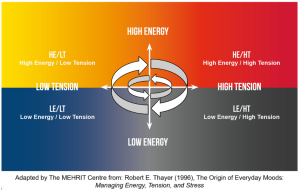We make judgements all the time. Deciding what to wear, what to eat, where to go… here or there… etc. Each of these have an evaluative calculation at their basis. When these choices are considered in a calm, cool, and collected or “emotionally regulated” manner they are rooted firmly in the pre-frontal cortex; otherwise known as the thinking part of our brain. In fact, one of the most amazing abilities of our human brains is that of being able to evaluate, and/or to reappraise, making it possible to choose rationally. Whereas the Limbic part of brain facilitates “fight/flight” reactions.
Now, allow me to differentiate between “choices” and “reactions.” Fundamental to our ability to emotionally self-regulate is to be mindfully aware of our own energy and tension levels. In previous articles I’ve discussed the Thayer Matrix as pictured here with its Energy/Tension continua.
I also previously discussed the energy drain, or perhaps more accurately, the energy burn required to deal with the tension or stress triggers we face daily.
we face daily.
These stressors can be Biological in nature, Social, Emotional, Cognitive, or even Prosocial in origin. What bothers one of us may not bother another. Or once again, more accurately, what is an energy burner for one of us, may not be for another.
The unique constellations of stresses that impinge on our metabolism are as individual as we are. However, the Thayer Matrix quadrant in which we might find ourselves as a result of energy/tension levels are universally relevant.
We are all more engaged, and in tune with the challenges we face when we are in a High Energy/ High Tension state (HE/HT). We are what many would call “in the zone.” The HE/LT state lends itself very well to recreational play – not to be confused with athletic competition, but rather play for play’s sake. LE/LT is conducive for sleeping/resting in order to recharge. Leaving us with the quadrant most associated with negative judgments – LE/HT (Low Energy/High Tension). Negative judgements in my case are often a symptom of being overstressed and under-energized.
These judgements can range from why is that driver in front of me going so slowly? Or why can’t this cashier move more quickly? To even, Why would that person do that?
So now I ask…. Who are we to judge?
Especially when now, we know Why we become judgemental!
Cognitive Dynamics can help by introducing you to Shanker Self-Reg©





Leave A Comment